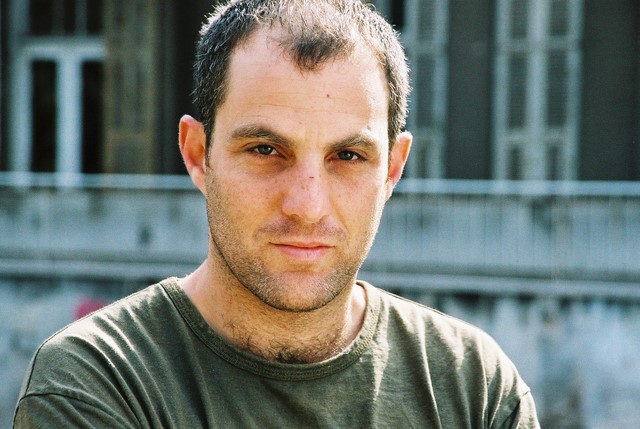FEBRUARY 29, 2008
INTERVIEW: ERAN KOLIRIN
When the Music's Over
By Mark Jenkins

The Band's Visit director Eran Kolirin is looking for something.
(Sony Classics)
ISRAELI DIRECTOR ERAN KOLIRIN's first feature, The Band's Visit, observes the brief and accidental encounter of an Egyptian police orchestra and a few residents of a desert hamlet. The story is a gentle parable of Israeli-Arab relations, but it's also very personal, as the 35-year-old filmmaker revealed in a January 31 interview at Georgetown's Ritz-Carlton Hotel. Even the film's setting, a failed-Utopian town, is drawn from Kolirin's life.
It's a very strong childhood memory for me, the Communistic architecture in the desert. They used to take me there, because I have asthma. I have a strong memory of those kind of monumental buildings. All those places have changed a lot today, compared to when I was a kid. So when I shot it, I tried to make it look like it was in my memory, not how it is today.
Do you see aspects of your personality in all the major characters?
Yeah, of course. This is the only way to write, as far as I'm concerned, to find yourself in everything. In every major character, there's something from me.
Is it significant that the band is from Egypt?
I guess for me, yes. It began with this idea, the story of an Egyptian band. So I don't question, "Why an Egyptian band?" I know it has some meaning for me. If I analyze it backward now, Egypt for me represents Arabic culture. You tell me "Egypt," and my first association would be music, films, and maybe President Sadat leaving the plane in Israel in 1978, dressed in his suit, very dignified. Those are my private associations, and they went in the film.
Does Egypt also have a political significance?
Those things with the culture are political. With Israel in a frenzy of capitalism, it's more and more trying to be immersed in the West, and the connection to a more regional culture is lost. For a long time, the establishment tried to erase this connection. Still, there's a yearning to be connected to the region; on the other hand there is no possibility of it. So it's all political questions. Is Israel a branch of the West in the region? Or is Israel connected with the region authentically in some way?
Egypt represents this question. Because there is a history with Egypt. With commerce, and not fighting, which is important. But there is no cultural exchange, no emotional exchange, between the countries.
Is Egypt better rooted in tradition?
I think all the region is undergoing this process of forgetting itself. Israel is losing it, and also Egypt is losing it. It's all part of globalization.
Your film suggests that, on the personal level, Israeli-Arab conflict is absurd.
On the one hand, any conflict is absurd. On the other hand, it doesn't help too much to say it's absurd. It was very important to me that the movie state itself as a fable. As soon as the band leaves, you're back into reality, which is completely different. It should have been absurd, but it's not. Life is much, much harder. In this sense, the movie is rather pessimistic. The relationship will disappear like morning dew.
Pessimistic because there's no long-term transformation?
Because what's happening is inside brackets, outside the real world. The movie puts the camera only in this corner; the magic is happening only inside the frame. If you know the context, you know that outside is complete chaos. It's very clear that this whole story disappears in the morning. All the characters will be left alone, and no real connection was achieved. I mean, there was, but only for a moment.
The film was disqualified from a foreign-film Oscar nomination because its dialogue is mostly in English. Did you ever think there was another way to do it?
No, it's very natural. Again, it's part of the tragedy that this movie talks about. Hebrew in a lot of ways was very close to Arabic, but since they reinvented Hebrew, now those two languages are very different. Half of the Jewish population of Israel is descended from people from Arab states, but their ancestral language was erased. The people who established Israel didn't want to have this connection, the same way they didn't want the Europeans speaking Yiddish. So most people can't speak Arabic anymore; if they meet someone from Egypt, they'd be much more comfortable speaking English. This is what would happen, so that's how I did it.
Is there an Israeli equivalent of the Egyptian band, that would play traditional music?
Like a police orchestra? [laughs] First of all, we don't have traditional music. This is the thing with Israel. There is Jewish tradition, Jewish music. But you have different music from Eastern Europe, and different music from Sephardic Jews. You don't have traditional Israeli music. They invented it, just like invented the traditional dances in Israel. They are not real traditional dances. They made them up, 50 years ago.
Our longing in Israel, I think, is to have something traditional like this, which the Egyptians have. People in normal countries have this very simple thing, traditional art. But we don't. So there's this yearning: Please give us some tradition, give us some culture, and maybe we can give you back the benefits of having no culture, which is to be a very quick, improvisational people, which the Israelis are.
That sounds like the United States.
I never thought about it that way. That's interesting. I guess at the end of the day, it's a personal question. What do you feel about yourself? I don't know how Americans feel. I feel that there's something missing, in me.